8/22/2009
7/13/2009
Beans, Magic, Mud
In June we made tofu at the bean curd farm. I expected a mildly interesting field trip but it turned out to be a pretty fun time.
Step 2) Pour the beans into hot water, sift & smoothen, pour back into hot water, and repeat until the texture is right
 We also made rice cakes. We all took turns pounding the huge glob of rice. After the students, the teachers finished the job.
We also made rice cakes. We all took turns pounding the huge glob of rice. After the students, the teachers finished the job.
 A while back a magician also came to our school. There was lots of audience involvement. When I first walked in midway through the performace he was pointing a gun at the crowd of children and shaking his hand rapidly like he was about to slip and fire a round at a random kid. This made everyone go CRAZY but it was all in good fun. This would never fly in the states.
A while back a magician also came to our school. There was lots of audience involvement. When I first walked in midway through the performace he was pointing a gun at the crowd of children and shaking his hand rapidly like he was about to slip and fire a round at a random kid. This made everyone go CRAZY but it was all in good fun. This would never fly in the states.This weekend I went to the Mudfest in Boryeong. Sorry, no pictures, wayyyy too wet and muddy. The fest was both a disaster and a success.
0
Regardless, the foreigner population is a very eclectic bunch of fun and interesting people. We were able to let loose and get to know each in what ways we knew how this weekend in Daejon. I feel that the teachers in Korea are a culture unto themselves whether we like it or not; whether Koreans like it or not. Korea is such a homogenous country and the divide between national culture and foreign culture is clear-cut and pretty bifurcated. There are military people, international students, and other visitors claiming residence in this country. They're sort of a different breed more identified with their own purpose. I gather from the teachers I meet that we're more nomadic and less pinned-down to anything in particular. But even though ESL teachers come bringing probably the most diverse range of personalities of any population that I'm aware of and even though we all come to Korea under different circumstances, it doesn't change the fact that we're all here now living and learning and even being indoctrinated into something slightly Korean and sharing the common life of managing classrooms full of Korean children.
7/09/2009
Lolli-pop Culture
Lollipop, lollipop
Oh lolli, lolli, lolli
Lollipop, lollipop
Oh lolli, lolli, lolli . . .
In fact I'm debating using it with my kindergarteners next week. I think they'd love trying to make the "POP" sound with their thumb in their mouth. Strangely, lollipops have become rather ubiquitous in pop culture this year in both countries that I've been living in.
Whenever something like this happens I'm always curious as to whether some secret information has been shared or stolen amongst the successes. I thought I'd put the three videos together for a serious round of listening. I can't really say what's so great about a lollipop besides that it is fun to say and it has some questionable symbolic connotations. And a lollipop is a sweet treat that we all can relate to.
The other "Lollipop" song is a collaboration of Korea's most popular boy band, Big Bang, and the girls from 2NE1. It's an energetic and fun video and should be delightfully foreign for anyone not used to Korean pop (though not nearly as silly as many of Korea's advertisements). The third lollipop belongs to Lil' Wayne. It glorifies the things that most American hip hop glorifies (curvy women and expensive things), while incorporating LW's avert desire to be a rock star (though he already is one). I think there might be some sort of progression here starting with the somewhat stagnant and probably repressed Chordettes in the 50s, then to a culture opening up to free expression and dancing with Big Bang, then maxing out on sexuality and materialism at Lil' Wayne. You be the boss.
The Chordettes
Big Bang (빅뱅)
Lil' Wayne
Pop culture is weird sometimes.
7/07/2009
July 4th Weekend
Even more motivation to buy a motor bike.
Destination is priority, and traffic laws are nil. Blind spots are around every corner and old farmers who may not have seen cars 10 years ago are wandering aimlessly about their property (which is now part of the street). We own the road, not hesitating before crossing one-lane bridges and passing strings of cars on winding mountain roads.
It's like a New York taxi doing the Appalacian Trail.
 (I see a dot in the sky that is a man with a motorized parachute. I try to vicariously try to imagine how liberating his flight must be)
(I see a dot in the sky that is a man with a motorized parachute. I try to vicariously try to imagine how liberating his flight must be)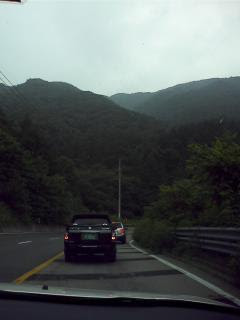
I finally meet up with the group at the ATV rental and the first thing we do is walk the track. Half of us begin to have second thoughts when we see that 30% of the terrain is flooded. Three cop out while the rest of us are ready to get dirty. I didn't make a crash course through the boondocks for nothing. Since I'm the rookie, I start with the mini bike. It's compact enough to manuever around the deep puddles. But I would not recommend riding straight through like this--

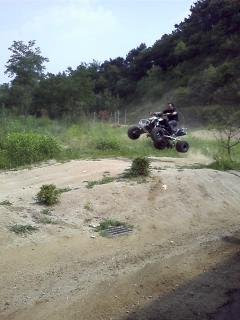
 Nowhere, ROK.
Nowhere, ROK.
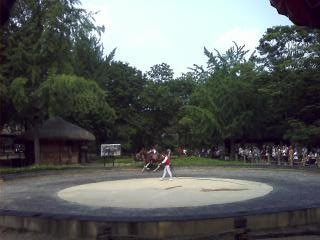

 Pick you're poison.
Pick you're poison.

Happy 4th.
Plunging the RoK
 I don't know where to begin. Korea has been my playground. My PC man helped me navigate the complications of Korean phone software. Now I have enough pictures from my phone to span an entire web page. I have some catching up to do.
I don't know where to begin. Korea has been my playground. My PC man helped me navigate the complications of Korean phone software. Now I have enough pictures from my phone to span an entire web page. I have some catching up to do. I couldn't sit still for a day of rest so I ventured Seoul-o to Gyeongbok Palace. Apparently only a few dozen structures remain on this ancient site since the Japanese takeover of Korea in 1910. You can see how the royal archtiecture is preserved amid rapid Korean construction.
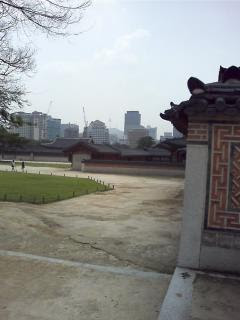 In contrast to Suwon, the city that mingles with the walls of the old Hwaseong fortress, Gyeongbok is a palace contained completely within its walls. Within these walls are hallways, meeting halls, royally important rooms, and fancy-dance buildings.
In contrast to Suwon, the city that mingles with the walls of the old Hwaseong fortress, Gyeongbok is a palace contained completely within its walls. Within these walls are hallways, meeting halls, royally important rooms, and fancy-dance buildings.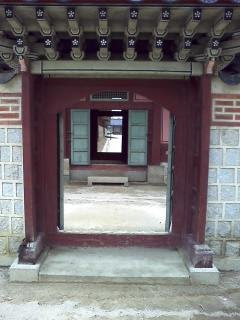

 There were also two museums. Museums for me are usually boring, unless I find an exhibit that strikes a cord. The former of these two museums contained old stuff from inside the palace. It was a bust. The latter was the Korean Folk Museum and inside I discovered some unusual things.
There were also two museums. Museums for me are usually boring, unless I find an exhibit that strikes a cord. The former of these two museums contained old stuff from inside the palace. It was a bust. The latter was the Korean Folk Museum and inside I discovered some unusual things.  Hangul is the only invented language, guided in its creation with a direct purpose--to give correct sounds for a unified land to communicate and give instruction to each other. This reminds me of Ben Franklin christening the word "Americans" for the mixed people of the United States struggling to find a single identity. Franklin said this word would last, for it provides for the people of the New World a common fellowship. Hangul has lasted, giving the people of Korean their Korean language today--distinct, efficient, and wickedly scientific. Korean language (aka Hanguke) exists in stark contrast to its brethern Chinese. Instead of tens of thousands of symbols to learn, there are only 24 symbols; each symbol ready to fit with 3 or 4 other symbols to make a single syllable. This makes the alphabet ridiculously easy to learn but listening for meaning terribly difficult: because there are few sounds there are many words that sound increbily similar (especially to a Western ear).
Hangul is the only invented language, guided in its creation with a direct purpose--to give correct sounds for a unified land to communicate and give instruction to each other. This reminds me of Ben Franklin christening the word "Americans" for the mixed people of the United States struggling to find a single identity. Franklin said this word would last, for it provides for the people of the New World a common fellowship. Hangul has lasted, giving the people of Korean their Korean language today--distinct, efficient, and wickedly scientific. Korean language (aka Hanguke) exists in stark contrast to its brethern Chinese. Instead of tens of thousands of symbols to learn, there are only 24 symbols; each symbol ready to fit with 3 or 4 other symbols to make a single syllable. This makes the alphabet ridiculously easy to learn but listening for meaning terribly difficult: because there are few sounds there are many words that sound increbily similar (especially to a Western ear). 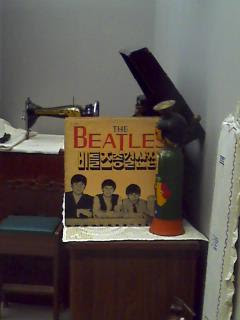
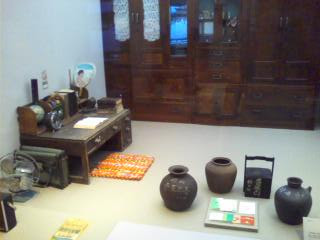
 Those needles are inserted into these dots. Better than a back massage?
Those needles are inserted into these dots. Better than a back massage?
6/21/2009
Brief Aerial
6/13/2009
No picnic for the fish
This week I will begin teaching my morning classes with a new co-teacher. To make sure our gears were greased, we ate a fresh fish feast.
The fish market in Guri wreaks of water fowl. It's a gritty aquarium, a warehouse full of lobster tanks that aren't full of lobsters. They're full of soulless mollusks, disturbed sea-cucumbers and limp penis-fish, among other sea brethern. Commercial aquariums are friendly fish-funhouses but they hide behind veals of fakery. Walking through the fish market, I'm reminded how real these strange looking creatures are. I also worry about how real they'll feel as my fresh fish meal.
With my New Zealandic translator I waited outside while C and his friend picked our poison. I had to stay secret or fish sellers would up our pay. When we went in we had to wait for our fish monger to do some secret slicing and dicing. There were some viscious dishes swimming around the place. We mingled with our future food, discussing their qualities and health benefits while tantalizing the ugly ones with our fingers. The earlier mentioned penis-fish looked like a giant, bulging you-know with a single hole for eating and excreting. It's a manly supplement. But we had other fish to fry (well, eat at least). Today's fish dish would be red snapper with sides nak-ji and mysterious sea snails.
Nak-ji is mostly novelty. This is common octopus, raw of course. If you ever severed a worm, its parts continue to squirm. Octopus tentacles, distant cousins of worms, behave the same. And if you recall your octopi anatomy, you know that each tentacle has many little suction cups. They stick and wiggle. These suckers in action make for the most rebellious food, latching to all surfaces from table to tummy. Delish dish with some salty sesame oil.
It's an intimate event moving from live fishies to fancy cuisine. We shared our sides and soju and soup and moved on for a second round.
Korea is a weird place with a wonderfully unique culture. I'm reminded of how alien everything is when I listen to my translator's peculiar Korean-New Zealandic accent from the seat behind me as we drive to our next location. There are certain sounds and habits of speaking that stick from one's native tongue that never go away and color one's manner of speaking with personality and culture.
Language is fun to play around with too. A braai is a South African cookout with tasty marinated meat. Afterwards I learned some words in their Dutch dialect Afrikaans which my American friend and I could shout oblivously. When no meaning is attached, making these sounds is just fun and games. I believe it's the same way when drunk Korean men shout silly English at me. But when meaning is attached that is when words become language--at least personally these sounds start serving a social function. Language only works if you believe you're being believed.
After we called our African friends some dirty names in their native tongue, we all had a laugh at the novelty of meaning. Korean drinking games were next. These all include sitting in a circle and trying to pay attention to some strange sequencing while everyone participates in the pattern of saying things and pointing at each other. These games are perfect for the classroom! Everyone has to pay attention and the words must come out instinctively. Inspired by these games, I created my own classroom game, which I then brought back to rounds of drinking. It's simple word association. As we take turns in the circle, each person must say a word reasonably associated with the last person's. For example:
HEN > FARM > BARN > RED > APPLE > BANANA > BIG BIRD
Weak connections aren't acceptable and I generally rule out word categories that lead to lazy habits (such as colors or names of immediate suuroundings). In the classroom, as game master, I try to keep the pace fast and steady. One of my goals as a teacher is to get the instinct gears running. Sharing a meal or playing a game can get any group of people grooving in synch if done successfully. I'm hoping my new co-teach and I can keep the groove and sweep our students into it as well.
CO-TEACH > FISH MARKET > OCTOPUS > SOJU > COOKOUT > BRAAI > AFRIKAANS > LANGUAGE GAMES > TEACHING ENGLISH
5/31/2009
Tall Things
 Leap of faith:
Leap of faith:
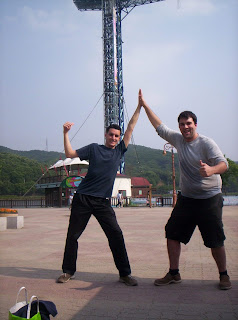 Our mission was to bungee jump and after some amateur navigation through Seoul we got our chance to take the plunge. Literally. You can see Eric got a free dip in the pond.
Our mission was to bungee jump and after some amateur navigation through Seoul we got our chance to take the plunge. Literally. You can see Eric got a free dip in the pond. 
You can cimb a mountain
But you'll never be free!!!


The view from the tower is breathtaking. It's hard to take in how much man-made structures flood through these mountains. I can only imagine for how long the train lines snake and burrow into country side, bringing a whole stampede of glass and concrete right behind it.
 I guess I was still feeling grounded on Sunday, so I decided to climb another mountain. My climb started beside another hiker--an older Korean man who apparently had studied English literature and wrote his thesis on D.H. Lawrence's Sons and Lovers. We talked briefly about American Pragmatic philosophy (a big fan apparently) before in no time at all reaching the mountain's peak. I've had better hikes when I was in grade school (in fact, I just went on one with my kindergardeners four weeks ago). I was slightly disappointed so I continued to wander and found a long network of trails. There's some sort of inspiring explorational quality to hiking. Maybe navigating foreign terrain is like the Kantian aesthetic philosophy, a sort of free-play of the mind. Coming to a foreign country alone satisfies this. Many travelers I meet have similar hobbies: hiking, exploring Seoul, learning the metro lines, not to mention teaching which is sort of a mental exercise in the same way. Finding my way around this mountain reminded me of orienteering in the woods as a Boy Scout. But eventually reality popped back into existence.
I guess I was still feeling grounded on Sunday, so I decided to climb another mountain. My climb started beside another hiker--an older Korean man who apparently had studied English literature and wrote his thesis on D.H. Lawrence's Sons and Lovers. We talked briefly about American Pragmatic philosophy (a big fan apparently) before in no time at all reaching the mountain's peak. I've had better hikes when I was in grade school (in fact, I just went on one with my kindergardeners four weeks ago). I was slightly disappointed so I continued to wander and found a long network of trails. There's some sort of inspiring explorational quality to hiking. Maybe navigating foreign terrain is like the Kantian aesthetic philosophy, a sort of free-play of the mind. Coming to a foreign country alone satisfies this. Many travelers I meet have similar hobbies: hiking, exploring Seoul, learning the metro lines, not to mention teaching which is sort of a mental exercise in the same way. Finding my way around this mountain reminded me of orienteering in the woods as a Boy Scout. But eventually reality popped back into existence.5/25/2009
Sound and Vision
 Later on in the day the stage was highlighted by a guitarist and a killer solo a cappella vocal performance to end the festivities. I saw two of my second grade girls during the guitar performance. They brought me some bananas (one of everyone's favorite treats around here) and we got up on the docked Korean vessel and started showing off, shouting English words, jumping up and down and leaping off the boat. We caused such a stir that the photographers turned their attention to us instead of the stage.
Later on in the day the stage was highlighted by a guitarist and a killer solo a cappella vocal performance to end the festivities. I saw two of my second grade girls during the guitar performance. They brought me some bananas (one of everyone's favorite treats around here) and we got up on the docked Korean vessel and started showing off, shouting English words, jumping up and down and leaping off the boat. We caused such a stir that the photographers turned their attention to us instead of the stage.I guess a live performance showcase can only last so long before a bunch of energetic hooligans start stealing the show. Will be searching for pics of the Yangsu fest soon--hopefully our fooling around made it to some sort of web publication. Here's one of the dancers:
 One of the things they do is a water performance, which consists of one of the robed dancers eloquently splashing around in the river water. It reminded me of a mermaid folktale, but with a Korean twist. Water is pretty culturally important I gather--it is one of the elements symbolized on the national flag and the source of much of the food.
One of the things they do is a water performance, which consists of one of the robed dancers eloquently splashing around in the river water. It reminded me of a mermaid folktale, but with a Korean twist. Water is pretty culturally important I gather--it is one of the elements symbolized on the national flag and the source of much of the food. Most cultural symbols are imbibed visually and sonically (just think how big of a role movies and music play today). Some major cultural identifiers in the past are natural geography, performance rituals, and festive dinners. How much does eating a culture's food make you think, feel, and learn about that culture I wonder? This would be a great space to insert a video of some moving tentacles.
Most cultural symbols are imbibed visually and sonically (just think how big of a role movies and music play today). Some major cultural identifiers in the past are natural geography, performance rituals, and festive dinners. How much does eating a culture's food make you think, feel, and learn about that culture I wonder? This would be a great space to insert a video of some moving tentacles.5/23/2009
Pictures Please??? OK OK OK !!!
 Friday morning I missed my bus so I grabbed a taxi. I pass a narrow bridge over a large river and then I'm at my school. Here's a mountain in the distance. That's my bank to the right.
Friday morning I missed my bus so I grabbed a taxi. I pass a narrow bridge over a large river and then I'm at my school. Here's a mountain in the distance. That's my bank to the right. This is a garden at my school. It's very beautiful! Jo-an Elementary has a lot of property, and they don't let any of it go to waste. Our soccer field is huge, our playgrounds are frequent, and we have a driving range as well as a garden for each grade to practice their farming. We're actually a very small school with only one homeroom teacher for each grade level. We are also an associate school of another school in Guri. Like General Nash Elem, we get the problem kids. A common kinship has been established.
This is a garden at my school. It's very beautiful! Jo-an Elementary has a lot of property, and they don't let any of it go to waste. Our soccer field is huge, our playgrounds are frequent, and we have a driving range as well as a garden for each grade to practice their farming. We're actually a very small school with only one homeroom teacher for each grade level. We are also an associate school of another school in Guri. Like General Nash Elem, we get the problem kids. A common kinship has been established. This must be what I look like to my students. This picture was taken by CH.
This must be what I look like to my students. This picture was taken by CH. CH is an awesome student but he's a few levels above the other third grade boys. Being a sort of ringleader, can often be a deciding factor in how the class goes. However, there is never just ONE deciding factor. Teaching a class of 10 year-olds who don't understand most of my vocabulary demands a wide range of control.
CH is an awesome student but he's a few levels above the other third grade boys. Being a sort of ringleader, can often be a deciding factor in how the class goes. However, there is never just ONE deciding factor. Teaching a class of 10 year-olds who don't understand most of my vocabulary demands a wide range of control.
For instance: how can I find a balance between ten girls--sensitive but eager to learn, and ten boys--full of energy but unwilling to sit down--without losing someone in between? The trouble is if I lose someone then they might bring someone else along with them, and then one by one the whole class is gone.
I find that a very active game will get the boys going but the girls crying (since they usually can't keep up with the physical energy of the boys). Yet a well planned arts & crafts project can entertain the girls but fail to grab the interest of any of the boys. What's the best way to utilize an English classroom?
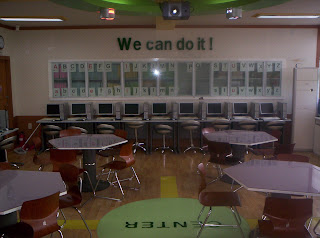 I'm still trying to figure this out. I can never have too many lesson plans but I can never follow through with one all the way through. Teaching a class of developing minds is like navigating the sea: you need a compass and a direction, an intention and a destination, but if the current ever shifts direction you can't ever fight it, you've just got to change course for a little while. Fortunately I can always catch a nice breather if I'm ever feeling a little taxed.
I'm still trying to figure this out. I can never have too many lesson plans but I can never follow through with one all the way through. Teaching a class of developing minds is like navigating the sea: you need a compass and a direction, an intention and a destination, but if the current ever shifts direction you can't ever fight it, you've just got to change course for a little while. Fortunately I can always catch a nice breather if I'm ever feeling a little taxed.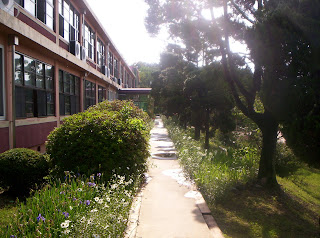 A front view of Jo-an elementary from the side. Right before lunch my kindergardeners invited me to a birthday party!
A front view of Jo-an elementary from the side. Right before lunch my kindergardeners invited me to a birthday party! I got dragged around the playground. . .
I got dragged around the playground. . .
 . . . until we found a rabbit.
. . . until we found a rabbit. We lost it somewhere in the bushes. After this I eat lunch and teach three afternoon classes. I find myself emulating my middle and high school Latin and math teachers to teach my sixth graders grammar.
We lost it somewhere in the bushes. After this I eat lunch and teach three afternoon classes. I find myself emulating my middle and high school Latin and math teachers to teach my sixth graders grammar.  And no, I don't have a Korean girlfriend and I can't speak fluently.
And no, I don't have a Korean girlfriend and I can't speak fluently.










